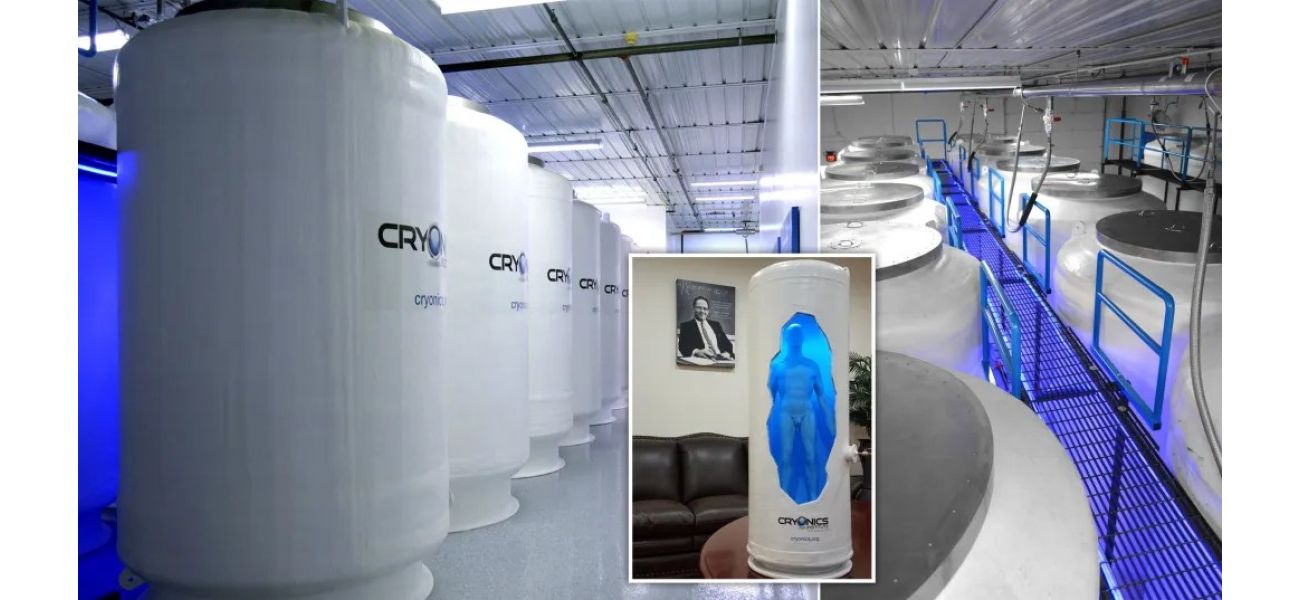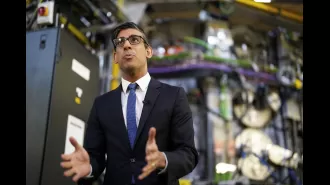A man from Britain was transported 3,750 miles and preserved in dry ice for possible revival in the future.
Hospice patient desired to have a second chance at life despite experiencing clinical death.
September 10th 2024.

Recent data from an organization that offers cryogenic services has revealed that the UK has the second-highest number of members after the US. This comes after a British cancer patient's body was transported over 3,000 miles after his passing, in order to undergo the process of cryopreservation in the hopes of a potential future revival.
The 50-year-old patient had previously signed up for a cryonics program that offered the chance of a "second life" through long-term storage in Michigan. In accordance with his wishes, his body was packed in dry ice at a funeral home in London before embarking on the journey to the Cryonics Institute.
According to a case report from the CI, the man was under hospice care at the time of his death. His body underwent the process of "perfusion," where blood and water are replaced with a specialized cryo-protection mixture to prevent ice formation and assist in preservation.
Once all arrangements were in place, the patient's body was transported in dry ice to Detroit Metro Airport and then transferred to the Cryonics Institute, located north of the city. These details were included in the latest release of cases by the institute, following the man's passing on February 29.
The Cryonics Institute utilizes a process where bodies are stored in a large "cryostat" and frozen in liquid nitrogen at a temperature of -196 degrees Celsius, in hopes that future technology will allow for a second life and potentially a cure for conditions that may have caused the initial clinical death. The institute currently houses over 250 patients who have paid for a chance at revival, including individuals from various professions such as chefs, students, secretaries, and professors. Surprisingly, the majority of these patients are from the UK, making it the second-largest source of members after the US.
The institute also offers its services for pets and human heads, with a total of two facilities in Michigan. The longest-standing patient, Rhea Ettinger, has been in cryonic suspension since 1977. Dennis Kowalksi, the president of the Cryonics Institute, has previously stated that cryonics is a gamble, as there is no guarantee of success, but also no harm in trying.
He compares the process to a "Pascal's wager," where the potential gain outweighs the risk. Kowalksi also acknowledges that cryonics has its critics, who believe it to be pseudoscience that robs the dying of their dignity. However, this has not deterred the growing number of individuals who have placed their faith in future technology to revive them.
The unnamed British patient, known only as patient #254, is among those who have taken the gamble and put their fate in the hands of groundbreaking advancements in science. Supporters of cryonics point to areas such as artificial intelligence, stem cell research, and nanotechnology as having the potential to make breakthroughs in the future.
Kowalksi has addressed doubts surrounding the possibility of reviving humans, especially when it comes to the brain, by drawing parallels to the progress made in conducting heart or liver transplants over the years. Despite criticism, the number of individuals signing up for cryonics continues to rise, with 85-year-old Alan Sinclair being one of the most well-known British members. He acknowledges that there is no guarantee of a second life but believes that coming out of suspension at 185 or even 1,085 years of age is worth a shot.
It seems that for many, cryonics offers a glimmer of hope for life after death, and the concept of an "ambulance to the future" is an enticing one. Only time will tell if this gamble will pay off, but for now, the Cryonics Institute and its members remain optimistic about the potential opportunities that the future may hold.
The 50-year-old patient had previously signed up for a cryonics program that offered the chance of a "second life" through long-term storage in Michigan. In accordance with his wishes, his body was packed in dry ice at a funeral home in London before embarking on the journey to the Cryonics Institute.
According to a case report from the CI, the man was under hospice care at the time of his death. His body underwent the process of "perfusion," where blood and water are replaced with a specialized cryo-protection mixture to prevent ice formation and assist in preservation.
Once all arrangements were in place, the patient's body was transported in dry ice to Detroit Metro Airport and then transferred to the Cryonics Institute, located north of the city. These details were included in the latest release of cases by the institute, following the man's passing on February 29.
The Cryonics Institute utilizes a process where bodies are stored in a large "cryostat" and frozen in liquid nitrogen at a temperature of -196 degrees Celsius, in hopes that future technology will allow for a second life and potentially a cure for conditions that may have caused the initial clinical death. The institute currently houses over 250 patients who have paid for a chance at revival, including individuals from various professions such as chefs, students, secretaries, and professors. Surprisingly, the majority of these patients are from the UK, making it the second-largest source of members after the US.
The institute also offers its services for pets and human heads, with a total of two facilities in Michigan. The longest-standing patient, Rhea Ettinger, has been in cryonic suspension since 1977. Dennis Kowalksi, the president of the Cryonics Institute, has previously stated that cryonics is a gamble, as there is no guarantee of success, but also no harm in trying.
He compares the process to a "Pascal's wager," where the potential gain outweighs the risk. Kowalksi also acknowledges that cryonics has its critics, who believe it to be pseudoscience that robs the dying of their dignity. However, this has not deterred the growing number of individuals who have placed their faith in future technology to revive them.
The unnamed British patient, known only as patient #254, is among those who have taken the gamble and put their fate in the hands of groundbreaking advancements in science. Supporters of cryonics point to areas such as artificial intelligence, stem cell research, and nanotechnology as having the potential to make breakthroughs in the future.
Kowalksi has addressed doubts surrounding the possibility of reviving humans, especially when it comes to the brain, by drawing parallels to the progress made in conducting heart or liver transplants over the years. Despite criticism, the number of individuals signing up for cryonics continues to rise, with 85-year-old Alan Sinclair being one of the most well-known British members. He acknowledges that there is no guarantee of a second life but believes that coming out of suspension at 185 or even 1,085 years of age is worth a shot.
It seems that for many, cryonics offers a glimmer of hope for life after death, and the concept of an "ambulance to the future" is an enticing one. Only time will tell if this gamble will pay off, but for now, the Cryonics Institute and its members remain optimistic about the potential opportunities that the future may hold.
[This article has been trending online recently and has been generated with AI. Your feed is customized.]
[Generative AI is experimental.]
0
0
Submit Comment





